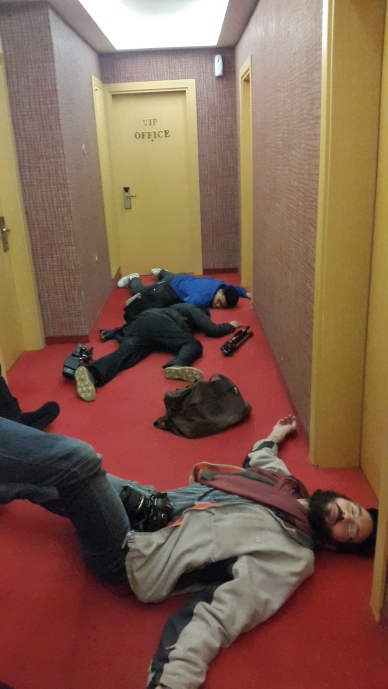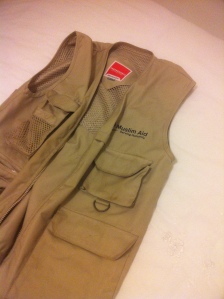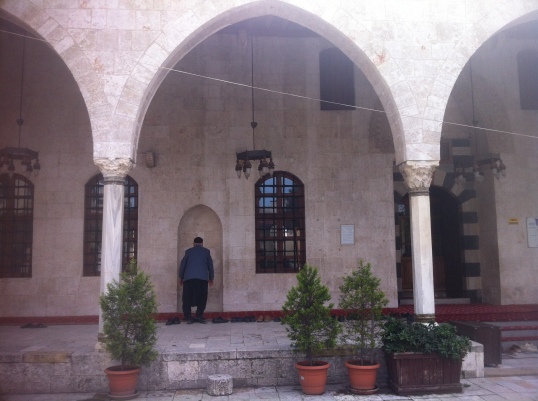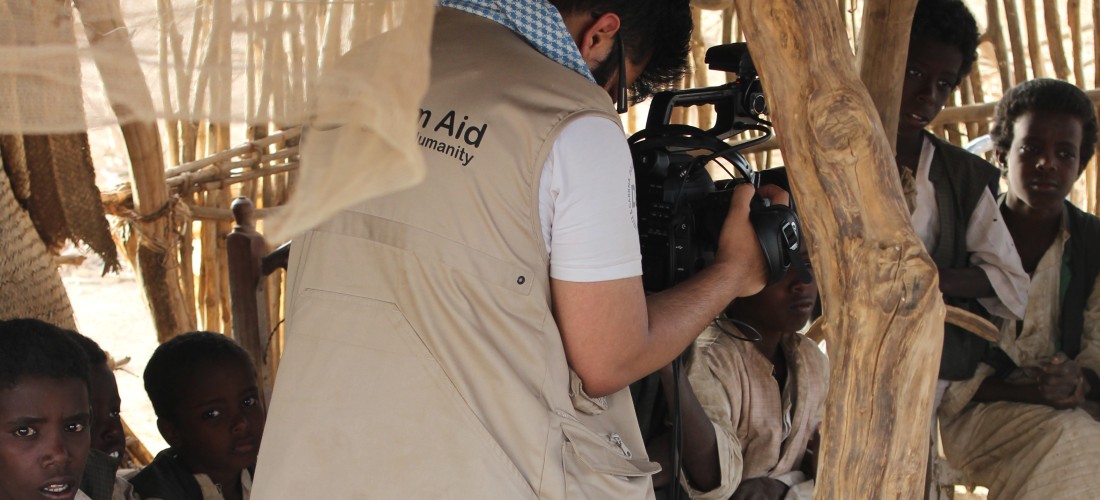Disclaimer: The views expressed here are my own, and not of any of the organisations I have ever been hired by or fired by!
An honour and a privilege
The journey to any foreign country on a filming expedition requires rigorous planning and preparation. But a trip to the Syrian border needs immeasurably more thinking and forethought. When I was told I would be flying out to a recently bombed, still-slightly-unstable part of the world, I won’t lie I felt an adolescent excitement, a kind of thrill at the thought of working in a conflict zone. Immature. First-timer. Call me what you want but I’d wanted to do this since I began my career in producing videos.
One of the worst most devastating conflicts of our time and soon, history; to document the stories of innocent children in a hope to improve their lives tangibly… what an honour! Likely, the impatience, the feelings of excitement showed on my face and it’s more likely that my eagerness scared my colleagues; nobody wants to travel to a genuinely dangerous part of the world with an action junky!
For security reasons I can’t and won’t mention exactly where we travelled, but I did my homework. The whole team did. We packed first aid kits, liaised with the local team on the ground, did risk assessments and made equipment checklists but as a prelude to this post let me say, emphatically, nothing but nothing can prepare you for meeting and documenting the victims (and I use the noun reluctantly) and relatives of murdered men and women.
Objective
Our main objective was to document the construction of an orphanage for Syrian children who had lost one or both of their parents due to the conflict. These children were also refugees, so we had the additional task of collecting their stories, of how they had escaped the conflict.
Creating videos for fundraising purposes oftentimes exploits the disadvantaged circumstances of vulnerable people so myself and interviewer Nur Hannah made a conscious decision that we would let people tell their own stories, on their own terms despite strict instructions from HQ to push for ’emotional’ stories. Well, I’m sorry, but screw HQ! (and I am sorry!). But I refused to pander frail and fragile people about the horrors they had witnessed. We straddle a fine line in NGO based communications/marketing, and we run a constant risk of slipping in to pornography of the charity world. It only takes a few misjudged questions during an interview, or leaving a camera running whilst someone begins to cry about a horror they recall, before the noble effort of sharing someone’s untold story becomes an exploitation movie!
Boring stuff first. Equipment:
Though we were going to be shooting mostly in one location I knew I didn’t want to lumber myself with unnecessary gear so our kit was as follows…
Canon C100 – Image is beautiful, the big sensor look really helped us achieve the aesthetic we wanted on this film. Won’t bother mentioning all the lenses but for flexibility most of the time I stayed on my 17-50 f2.8 Tamron with VC.
Rode NTG2 for onboard sound and Sennheiser G3 radio mics for most interviews.
Heavy duty video tripod – really glad I took this, the fluid head on it is indispensable and the beating it took on the journey, my other tripod would have ended up as 3 monopods.
Canon 600d for backup video and also stills. Really love my 600d, had it for ages and most DSLR shooters know how useful they are for discrete shooting.
I also took a reflector which I used a lot and a slider which was dead weight! Don’t know why I always do that to myself on shoots, sliders are really over-rated. Yes, they can have a use for certain story telling elements but they’re so overused theses days I think I get caught up in the feeling that maybe my films will be lacking if I don’t have at least one dolly shot. Anyway I kind of knew from the beginning that the kind of film making we would be doing wouldn’t need it. I still took it…
The Production Process
After a few hours sleep, right after our arrival we headed out with our fixer/security/driver Ahmet. Ahmet, we lovingly named ‘Jean Claude Van Damme’ (just like we did with Charles Bronson in Sudan! Sudan trip blog coming soon!) With my broken Arabic we deduced that we would first be arriving at the team office headquarters before heading to the orphanage. This would allow us to discuss and make plans with the local team to get an idea of the beneficiaries we would want to speak to. It’s not always the best idea to speak to the person with the most horrific story. We’re after compelling stories but compelling stories only come through with good communicators. The importance of local staff and fixers in this process is their familiarity with people, knowing who are the best communicators who also have unique and interesting circumstances. Sadly, my Arabic failed me. Or perhaps my Arabic was fine and Ahmet had a change of heart, but we headed straight to the orphanage. This meant the moment we arrived we were in action. The thing is, I say ‘action’ like it’s some kind of procedure speaking to people. But even from my limited experience in this job I know there’s certain things that you need to do before you whip a camera out and hit record. You need to meet people, say hello, make them feel comfortable. Heck we needed to make ourselves feel comfortable. 30 degrees C heat, still jet lagged and in a foreign country! Certainly not top form to start shooting. So with little to no preparation we had already begun. The strength of the final film is credit and testament to the ability of our team, Nur Hannah (interviewer) Thabrez (regional FR officer) and myself (producer and camera op).
The moment we stepped in, sister Zeina the orphanage manager took us around the building, an impromptu tour where her husband Abdul Ghani (the key co-ordinator of the orphanage) subtly identified children in the orphanage to us. Sister Zeina was a light skinned mature woman, a mother though I didn’t know it at the time I could still tell. She wore a bright white almost angelic hijab and spoke very good English. I felt close to her straight away, she was a graduate of English literature just like me. Her husband, tall, thin and quite a serious looking man. I still remember how he gestured who some of the children were because it was so sweet, and yet so tragic. In one instance he told us he would go and put his hand on the head of one of the children who was partially sighted, and when he went over and touched the little girl on the head, he did it like a loving father. I think what stayed with me about it was the thought I had at the time, that that little girl was probably appreciating a brief moment of affection and solace, but to us it was part of our machinery in generating a film, a sleight of hand in the magic of movie making. I don’t know. It’s one of the many things that still kind of haunt me…
Overwhelmed by the flood of incredibly traumatic accounts, and flustered by the fact that the children and families who had been gathered to meet us had to leave soon and might not return during our 3 day stay, Nur and I decided it would be good to start rolling asap.
The first interviews were conventional. With Nur interviewing and sr Zeina translating, I set the camera up beside and just behind them. I used radio mics and I tried keeping myself as quiet, discrete and distant as possible to help Nur ease her interviewees in; but to be honest I think after what most of these people had been through our presence with a camera wouldn’t have done much to phase them.
There was little 10 year old Wiyam, a girl with the kind of beauty that could take your breath away, and it was her mum who spoke first. A lady covered from head to toe. I could barely see her eyes and to my own frustration struggled to relate to her story. She spoke about how her husband had been ‘martyred’. I do remember thinking how Syrians were such dignified people. She said martyred, and not murdered. I don’t believe it was because she was some religious fanatic. It’s just that the word martyr placed a kind of honour on her late husband; didn’t allow for his memory to be marred by the perversity of the conflict. Inevitably as the interview went on she found it harder to speak as her emotions overcame her. It’s odd, interviews can have this strange way of starting off quite dry, despite the mention of really horrific things; and yet, as the interviewee gets drawn further in to their own feelings the slightest, most banal memories release the flood gates. We ended the interview when she couldn’t speak any more.
I remember feeling a bit confused with myself, that I hadn’t been moved despite hearing and seeing a woman slowly break down recounting the experience of losing her husband. Perhaps it was because I didn’t fully understand her Arabic. She also spoke from behind a face veil, for her own sense of security. Actually I think it was because I watched the whole account through the window of my camera monitor. It sort of kept me safe from feeling actually connected or in any way present in the vulnerability of the conversation. After speaking with her daughter Wiyam, Nur hadn’t been as protected as I had been. As she and Zeina cried, in front of Wiyam who sat innocently and maybe a little perplexed too, I looked at them both in envy.
The following interviews were just as exhausting, and as I had tried to warn the team, time consuming. We only achieved a few more, unfruitful as they were, before it was too late for the guests to sit and wait any more. We let them return home; some of them we were told lived in stores and warehouses… We couldn’t hear anything about these people without it being heart shatteringly tragic…
With the sun going down, the heat slowly dropping, I had a chat with Nur to figure out the game plan going forward. The problem was that we weren’t getting the kinds of statements from the children to make a documentary or any kind of focused piece about children. The kids were so shy, and sister Zeina told that us that some of them were just too traumatised to speak. They would simply nod yes or no to questions or give quiet mumbled answers. This was going to be a huge obstacle because the film was about an orphanage and the need for it. Without children telling us their problems, their needs and hopes we’d just have a set of tragic accounts from widows and some shots of a building… Tired and dumbstruck by our day, we decided to do one final interview, with sister Zeina herself.
Again… a completely conventional set up. Nur spoke to her in English and I kept myself and camera beside her, out of the way, unobtrusive and discrete. She had been mic’d up with my wireless sennheisers, so it was quite easy, a nice relaxed conversation. She was very honest, letting Nur guide the tone and opening up in a way that I couldn’t help but feel guilt. I think it was midway through the interview that I realised how I wanted to move forward over the next two days. Light bulb moment! Not to exaggerate or hyperbolise , but it was basically the same way Penicillin was discovered. BY ACCIDENT! No, not by accident actually.
It was Nur’s genius. The role of the interviewer in crafting the story for any film is critical. It’s not as simple as sitting in front of someone and reading out a list of questions. You need to build rapport, make interviewees comfortable, get them to open up. That needs skills, it needs a deft hand and a light touch. Though children would certainly be the focus of the film, it was Zeina, we realised, who was the heart of the story. She was a refugee herself, doing what she could to help her people, to help children. As their conversation went on and my memory card slowly filled, for the first time I was drawn headfirst emotionally into the world of pain and suffering that these families, these simple men, women and children had faced. Having spent and shared an entire day with her, speaking to people about their suffering, in the interview we collectively experienced the catharsis of reflection. I owe it to Nur for her sensitive and caring approach, and as producer I had come to my conclusion of how to execute the rest of the conversations.
Rather than the conventions of having a single beneficiary, whether it be man woman or child, speak timidly about their experiences to interviewer, I made Nur and Zeina an inextricable part of the composition. Zeina’s translations weren’t merely translations, we had realised over the course of the day that she being a refugee herself, her answers were more than just answers, they were interpretations, translations tinged with the colours of sadness and sympathy, with crucial pieces of information that we certainly could not have ascertained ourselves. So from a standard documentary-style 1 shot, the composition became a more informal 3 shot, or sometimes 4 shot. Yes this would be harder to edit, but we had her own interview as the heart and this way was more honest, and her excellent and emotive English meant we would save a ton of time in transcription later.
The rest of the filming became much simpler and clearer from this point. I could let the camera roll and move around with much more ease. Interviewees probably felt much more comfortable, interviews now as casual conversations as opposed to interrogations!
Here is a link to the film, please watch it and share it as well, if only so people do not forget that there are children out in the world who need our help: https://vimeo.com/100161862
Horror
The second day of filming, despite it being much more successful than the first, shook me up in a way I’ve never been before.
Through the course of the interviews, now being conducted in a new, more dynamic way, we stumbled across stories and accounts of the women who had escaped the conflict. I really want to share here what they had told us but it’s probably best I don’t. Even up until that point I was struggling to fully connect to what people were telling us, especially when I had the camera rolling. Always being behind the camera was keeping me relatively guarded. This was probably a good thing, it helped me do my job without losing my head. But there was a big part of me, a moral and human part of me that was seriously envying Nur and Thabrez who had cried and expressed their empathies by then.
But during one of the interviews, I was straining my ears to follow the very countryside Arabic of one of the elderly ladies, just to see if I could follow her story without the need for Zeina to explain it to me, when something happened. A word here and there was used that I felt was really out of context, considering Nur had asked ‘What have the children lost as a result of this war?’. The lady said several sentences and used the word ‘lahm’, Arabic for meat (like lamb chops, or steak), which at the time I could only think she must have been speaking about food shortages. Zeina’s face went pale, and I remember how she remained calm as the lady spoke. I thought nothing of it at the time, this is all retrospection, and even now I can’t be fully sure, but it hit me when she translated. The answer wasn’t the poetic and bittersweet answer I had been expecting. Zeina interpreted along the lines of ‘the children have seen things they shouldn’t have. They’ve been exposed to horror. Like seeing body parts strewn about their streets’. When she said body parts I realised why the lady used the word ‘lahm’ (meat). I think the thing that freaked me out was how she casually used a word that’s usually associated with food, restaurants, butchers, a civilian, homely thing that when I realised the link I was quite disgusted. She was also the grandmother of one of the little girls (Mona) who is in our film, that when I imagined little Mona, age 5, walking around her street looking at burnt and mutilated human flesh it didn’t make me cry… it planted a spore of fear deep in my heart and mind. I remember feeling cold. And then we moved on to the next interview, then the next, each getting increasingly horrific. One more struck me, which I won’t mention.
In retrospect I remember being quite absent and in a daze. It’s Ramadan right now so I’m fasting and it can happen that you could come across me in a hunger-daze. But it wasn’t like that then. I just had this empty stare, and I’m not sure if I was thinking about what the women had said or if I was wondering how the world could be such a heartless place, or perhaps a combination of everything.
That night back at the hotel I couldn’t sleep, all I could think about was the faces of the women who had spoken to us, how they looked so much like ghosts; walking dead people. I really don’t mean to say that in an offensive way, but how else could you describe the visage of someone who had seen their loved ones ripped from them in an instant, so savagely and worst of all, without reason.
Early in the morning I went for a taxi drive up the side of one of the nearby mountains and made a decision I wouldn’t let myself lose my mind, not at least whilst I was still on the job. We finished the next day with swift efficiency and finally headed back to the UK.
I’m flying through the second half of our trip but what was needed to be said I said in my last post. The short story was in part inspired by a nightmare I had after I got home. Seeing my wife and daughter again after only a few days though it felt like months, I felt anger at myself for being affected by our experiences out in the field. I asked myself how I could dare feel morose or dejected after only hearing stories, not having actually felt myself the pain of the loss that these people had felt. I didn’t want to speak to anyone about it. I know I’m still not fully expressing the things I heard and saw on the trip, about the wonderful people we met, the refugee camp, the girl who could bring me tea and coffee and smile despite her recent ordeal of living in sewers to escape the bombs. See? Things bubble to the surface but I can’t even bring myself to fully explain it and I concluded on the flight back that no one would really understand, that I could only relate what I had been told and that no matter how involved I might have felt in those peoples’ lives, I’d only ever be a footnote in their memoirs of pain, or a moment of shock during brief and pretentious conversations in the lives of people here in the UK. But the thing is I know what my job was, and is. It was to hold up a camera, and give them a voice. Maybe I’ll never be able to do it in words but I hope somehow I was able to in my film.
I’m early on in my career. I was told by someone that the more that I see these things the more I’d get used to it. I told them back that I hope I never get used to it. I know I hated some of the feelings that I had on this trip. But I also know that this is my contribution, this is my way of actively sacrificing and participating in history, in the effort to let the world know what’s happening to people and also, as a result, make things better. When my grandchildren ask me where I was when it happened I hope inshAllah I’ll be able to say to them ‘I was there and I shared in their pain, I brought their stories here to help them’. I’m not a reporter or a journalist. I’m an NGO video producer. Not to undermine the press but this means that when people see the stories I put forward they can reach out and make a difference. Voicing cries for the voiceless.
For updates follow me on twitter: https://twitter.com/SafiyyahsDad
Thanks for reading 🙂






